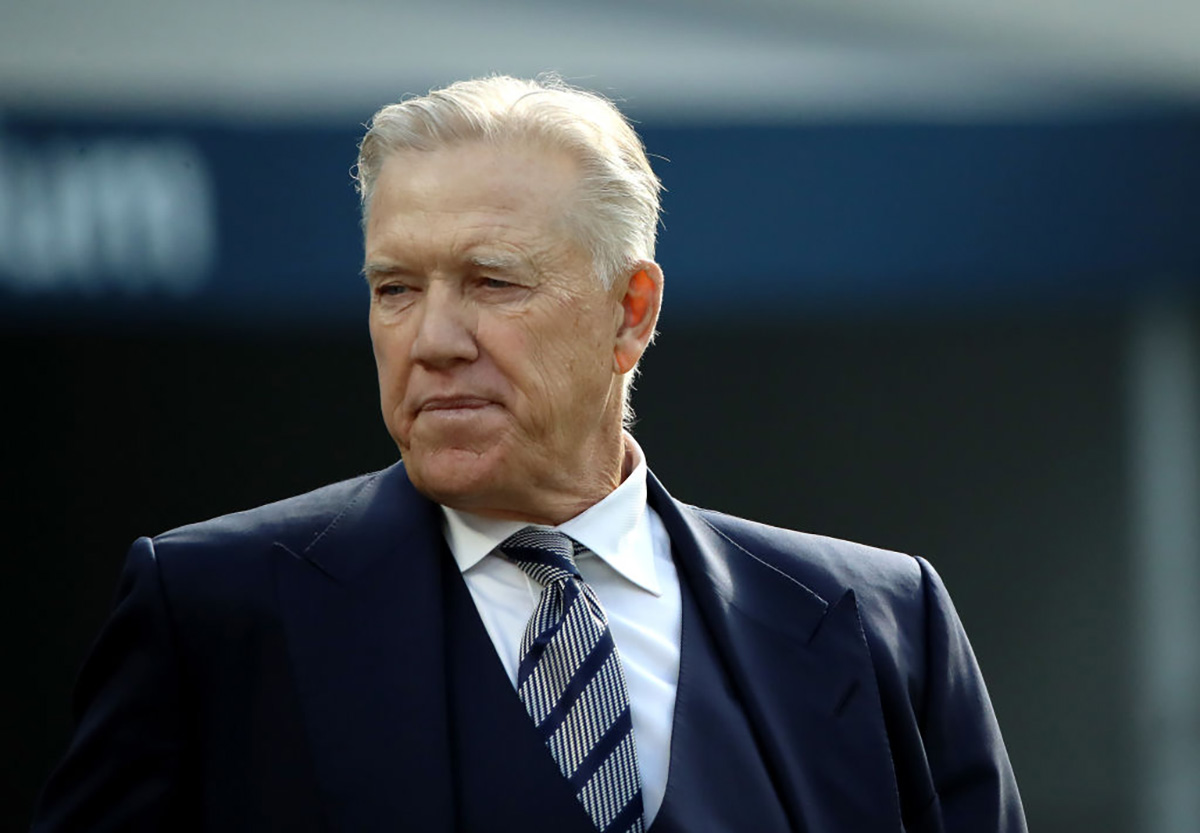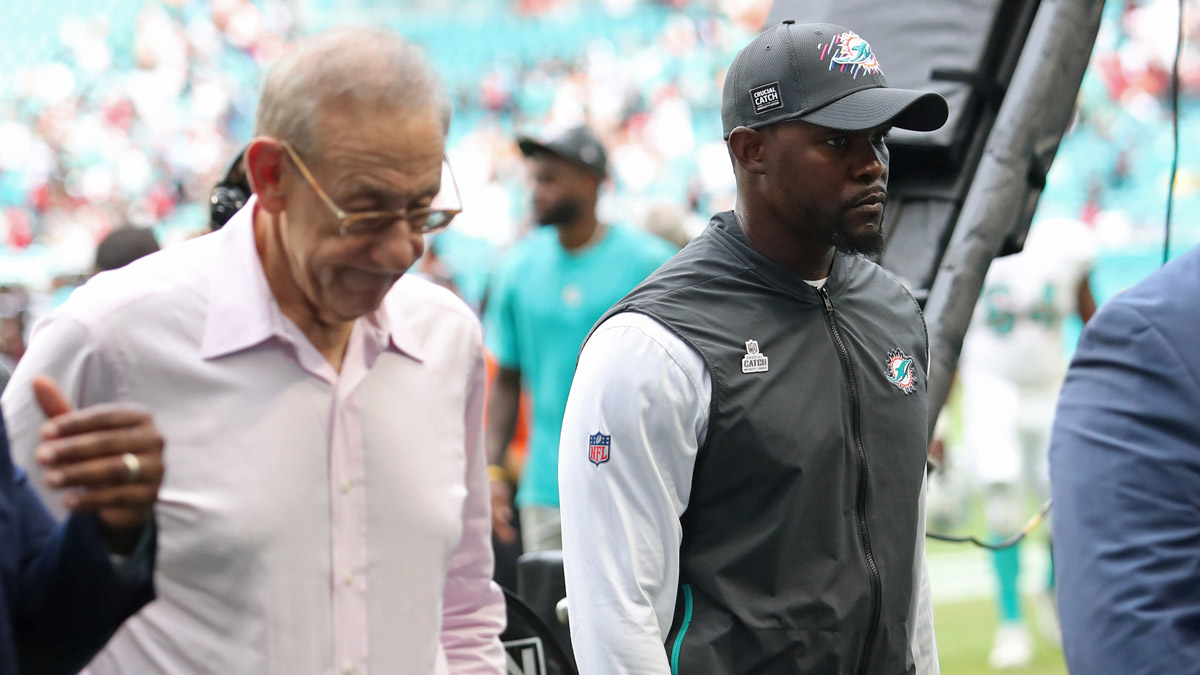The New York Giants are addressing the recent allegations from Brian Flores that the team and league exhibited racist hiring processes, calling the claims "disturbing and simply false."
In a statement issued Thursday evening, the team said that Flores's complaint raises "serious issues," but that their interest in him as a coach was "serious and genuine." They said that they had evidence that they did not make a coaching decision until the evening of Jan. 28, a day after Flores spent the day interviewing, meeting players and staff, and touring the facilities.
The team also denied any notion that New England Patriots Coach Bill Belichick would have any knowledge of their coaching search.
Get Tri-state area news and weather forecasts to your inbox. Sign up for NBC New York newsletters.
"To base that allegation on a text exchange with Bill Belichick in which he ultimately states that he 'thinks' Brian Daboll would get the job is irresponsible. The text exchange occurred the day before Coach Daboll’s in-person interview even took place. Giants’ ownership would never hire a head coach based only on a 20-minute zoom interview, which is all that Mr. Daboll had at that point," the team said in the press release. "In addition, Mr. Belichick does not speak for and has no affiliation with the Giants. Mr. Belichick’s text exchange provides no insight into what actually transpired during our head coaching search."
The Giants said that team President John Mara called Flores two days after he was fired from his position as head coach for the Miami Dolphins, informing him that they wanted to meet with him after the team hired a new general manager. Once Joe Schoen was hired, the team met with Flores for a dinner, followed by an in-person interview the following day.
Speaking with his lawyers on CBS’s morning show Wednesday, Flores said he was contacted by Belichick congratulating him on getting the New York Giants head coaching job days before his interview - a job that went to Brian Daboll, who is white.
“It was a range of emotions. Humiliation, disbelief, anger,” Flores said. “I’ve worked so hard to get to where I am in football, to become a head coach. To go on what felt like a shame interview, I was hurt.”
Flores said he still went on the interview because he still felt like he had some hope in changing the team’s mind and said he has “a belief there is good in people.”
“We knew he wasn’t getting the job on the day before the interview, “ said his lawyer, Doig Wigdor. “We knew it was a setup. We knew they were just trying to comply with the Rooney Rule.”
The rule, named after Dan Rooney while he was chairman of the NFL’s diversity committee, was created to give more minority candidates opportunities to become a head coach and reward teams who develop them.
The lawsuit in Manhattan federal court sought class-action status and unspecified damages from the league, the Dolphins, the Denver Broncos and the New York Giants, along with unidentified individuals.
Flores was fired last month by Miami after leading the Dolphins to a 24-25 record over three years. They went 9-8 in their second straight winning season, but failed to make the playoffs during his tenure.
"In making the decision to file the class action complaint today, I understand that I may be risking coaching the game that I love and that has done so much for my family and me. My sincere hope is that by standing up against systemic racism in the NFL, others will join me to ensure that positive change is made for generations to come,” he said.
In a statement, the NFL said it will defend “against these claims, which are without merit.”
The Miami Dolphins said in a statement that they are aware of the lawsuit and deny the allegations of racial discrimination.
"We vehemently deny any allegations of racial discrimination and are proud of the diversity and inclusion throughout our organization," the statement read. "The implication that we acted in a manner inconsistent with the integrity of the game is incorrect. We will be withholding further comment on the lawsuit at this time."
The lawsuit alleges that the league has discriminated against Flores and other Black coaches for racial reasons, denying them positions as head coaches, offensive and defensive coordinators and quarterbacks coaches, as well as general managers.
The lawsuit said the firing of Flores was typical for Black coaches who are not given the latitude other coaches receive to succeed. It noted that Flores led the Dolphins to back-to-back winning seasons for the first time since 2003.
The improvement came even though, the lawsuit contends, Miami Dolphins owner Stephen Ross told Flores he would pay him $100,000 for every loss during the coach's first season because he wanted the club to “tank” so it could get the draft's top pick.
“This game’s done a lot for me. I didn’t grow up with a lot,” Flores said Wednesday. “To attack the integrity of the game, that’s what I felt was happening in that instance.”
Wigdor, in a separate interview with CNN, said they have "corroborating evidence" about the allegations.
According to the lawsuit, his treatment by the Giants was typical of how the "Rooney Rule” has been administered for the last two decades.
In 2020, the NFL amended the Rooney Rule to stipulate teams must interview at least two minority candidates not associated with their own team for a head coaching vacancy. Also, one minority candidate has to be interviewed for coordinator positions as well as high-ranking positions in the front office, including the general-manager role.
According to the lawsuit, only one of the NFL's 32 teams employs a Black head coach, only four of them employ a Black offensive coordinator and only 11 employ a Black defensive coordinator.
“This is about changing the hiring practices in the National Football League, and that's what this lawsuit is about,” Flores said on CNN. “I want to coach football that’s what I’m called to do.”



